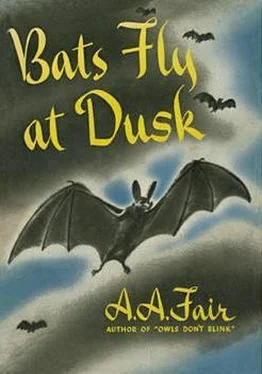Bertha laughed cynically. “Twenty-five dollars,” she announced, “is the limit of what she’ll ask at present, and that’s my limit to you. I’ll take that much of a gamble.”
“Twenty-five percent,” he insisted.
“I tell you there isn’t anything to get a cut from — not as yet.”
“All right, perhaps things will look up later.”
“Look here,” Bertha asked, “where can I get in touch with you?”
He said, grinning, “You can’t,” and sauntered out of the office.
Bertha glowered at the door as it closed behind him. “Damn him,” she said. “I’d like to slap him right across the mouth.”
“Why don’t you?” Elsie Brand asked curiously.
“I’ve probably got to play ball with him,” Bertha said. “You mean, accept his proposition?”
“Eventually — if I can’t get a better one.”
“Why?” Elsie Brand asked curiously. “Why do you get mixed up with people of that stripe, particularly when you don’t like them?”
“Because there’s money in it,” Bertha said, and strode across the office to closet herself with the morning newspaper in her private office.
She was halfway through the sporting sheet when the telephone buzzed on her desk. Bertha picked up the receiver, and Elsie Brand said, “Have you time to give a few minutes to a Christopher Milbers? He says that he’s met you.”
“Milbers — Milbers?” Bertha repeated the name a couple of times, then said suddenly, “Oh yes, I place him now. What does he want?”
“He didn’t say.”
“Tell him to come in.”
Christopher Milbers seemed even more self-effacing in Bertha Cool’s office than he had in Josephine Dell’s apartment. “I hope I’m not disturbing you,” he said apologetically.
“What is it you wanted?” Bertha asked.
“Miss Dell told me you were a detective. I was astounded.”
“We make confidential investigations.” Bertha said.
“A detective sounds so much more romantic than an investigator — don’t you think so?”
Bertha fixed him with a cold eye. “There isn’t any romance in this business. It’s a job, and I have an overhead just like any business. What do you want?”
Milbers said, “I’d like to employ you. I don’t know what your rates are.”
“It depends on the nature of the job and the amount of money involved.” Her eyes were showing keen interest now.
“You won’t mind,” Milbers asked, “if I take the time to tell you the story from the beginning?”
“Go ahead.”
“Well, my cousin Harlow was rather eccentric.”
“I gathered as much.”
“He was very much of an individual. He wanted to live his own life in his own way. He didn’t want to be dictated to or dominated. His attitude toward his relatives was always rather — shall we say coloured — by that attitude.”
Christopher Milbers raised his hands, opened the fingers far apart, and placed the tips together, pointed upward toward his chin. He looked at Bertha Cool over the upturned fingertips as though pathetically anxious to make certain she got exactly the point he was trying to make.
“Married?” Bertha Cool asked.
“His wife died ten years ago.”
“No children?”
“No.”
“You’re the only relative?”
“Yes.”
“How about the funeral? Who had charge of that?”
“The funeral is tomorrow. I’m having it here. I didn’t get the telegram announcing his death until Monday night. I was out of town, and there was some delay in getting the telegram to me. I trust you appreciate the delicacy of the decision that was then thrust upon me — as to the funeral?”
Bertha said, “I don’t know a damn thing about funerals. What do you want to see me about?”
“Yes, yes, I’m coming to that. I’ve told you that my cousin was eccentric.”
“Yes.”
“Among other things he had no confidence whatever in the economic security of established business.”
A spasm of expression crossed Bertha Cool’s face. “Hell!” she said. “That isn’t eccentricity. That’s sense.”
Christopher Milbers pressed his hands together until the fingers arched backwards at the knuckles. “Eccentricity or sense, whatever you wish to call it, Mrs. Cool, my cousin always kept a large sum of currency in his possession — in a billfold in his pocket, to be exact. I know that for a fact. I have a letter from him so informing me. He felt that at anytime a major emergency might develop. Moreover, on Thursday he drew out an additional five thousand dollars from his account. He planned to attend an auction sale of rare books on Friday afternoon.”
“Well?”
“When I arrived here to take charge, I was given the things that were on his body at the time of death — the clothes and personal possessions, watch, card case, and — the wallet.”
“What about the wallet?” Bertha Cool asked, her eyes glittering with eagerness.
“In the wallet,” Christopher Milbers said, “there was one one-hundred-dollar bill, one twenty-dollar bill, and three one-dollar bills — nothing else.”
“Oh, oh!” Bertha observed.
“You can imagine my perturbation.”
“Did you say anything?”
“Well, a person dislikes to say anything which might be considered an accusation until he is certain of his ground.”
“So you want me to make you certain of your ground, is that it?”
“Well, not exactly that. I’m certain now.”
“Yes?”
“Yes, Miss Dell, you know.”
“What about her?”
“She knows about the money being in his possession.”
“How come?” Bertha asked.
“Miss Dell was his secretary for more than a year, and she remembers the occasion when he dictated the letter in which he said he was going to keep five thousand dollars on hand. That is, she did after I refreshed her memory.”
“Where’s the letter?” Bertha asked.
“I have it in Vermont — that is, I hope I have it there. I very seldom destroy important correspondence.”
“Correspondence from your cousin was considered important?”
“Frankly, Mrs. Cool, it was.”
“Why?”
“He was my only living relative. I felt very close to him, very much attached to him. You know how it is when the family circle narrows down to just two people.” Milbers beamed at her over his fingertips.
“And one of them is wealthy,” Bertha Cool supplemented acidly.
Milbers didn’t say anything.
“How long since you’d seen him?” Bertha asked.
“It had been some time — four or five years.”
“You didn’t keep up with him very well, considering all the facts.”
“He preferred it that way. He liked to write, but as far as personal contact was concerned — well, I thought it was better in the interests of a harmonious family relationship to let our contact be by correspondence.”
Bertha said, “That’s one of those pretty speeches that sound as smooth as silk until you stop to pick the words to pieces to see what they mean. I’d say that you didn’t get along too well.”
“In oral conversation,” Milbers admitted, choosing his words with careful precision, “we had our differences. They were predicated upon certain radical political and economic beliefs. In carrying on a correspondence, it is possible to avoid certain controversial subjects if one is tactful. In a conversation, it is not so easy.”
Bertha said, “You could save a lot of your time and a lot of mine if you’d come right out and call a spade a spade.”
Milbers’s eyes lit up with the fire of enthusiasm. “Ah, Mrs. Cool, there you go, making exactly the same error that so many people make. A spade is not a spade. That is, a spade is a very rough general classification covering gardening implements of a certain conventionalized shape but used for different purposes. There are spades and shovels. There are various types of spades and various types of shovels. Popularly, a shovel is considered a spade, and a spade considered a shovel. As a matter of fact, however—”
Читать дальше









